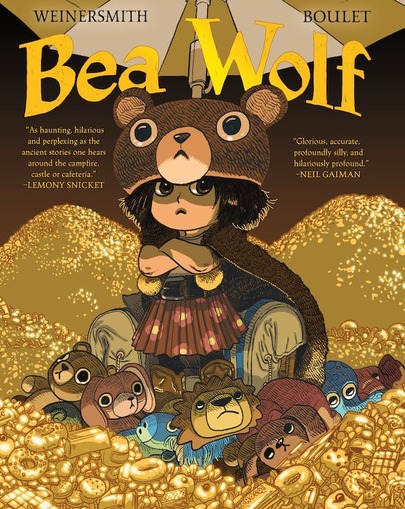Two weeks ago I wrote about my family's visit to Scotland for the World Science Fiction Conference. I promised that this time I would include some of my favorite quotes from that massive event. And I will, but first I wanted to tell you about a book.
I am not a fan of graphic novels - with one notable exception - but my daughter told me I needed to read one of the volumes nominated for the Hugo Award in that category and when she recited the first few lines I knew she was right.
Bea Wolf by Zach Weinersmith and Boulet is a retelling - no, that's not right. It is a new story, inspired by and borrowing its form from, the oldest tale we have in what could be called English.
If you have never encountered Beowulf it is a tale from approximately 1000 years ago about Scandanavian warriors whose mead hall is constantly attacked by a monster named Grendel. The creature is vanquished by a hero named, you guessed it, Beowulf. Here are the opening lines from a translation by JNO Lessie Hall:
The folk-kings’ former fame we have heard of,
How princes displayed then their prowess-in-battle.
Oft Scyld the Scefing from scathers in numbers
From many a people their mead-benches tore.
Notice the rhythm and alliteration. This text was never meant to be read. It was intended to be heard. Declaimed. Chanted even!
Now consider the first lines of Weinersmith's new text:
Listen to the lives of the long-ago kids, the world-fighters,
The unbowed bully-crushers,
The bedtime-breakers, the raspberry blowers,
Fighters of fun-killers, fearing nothing, fated for fame.
This is a tale of young children whose treehouse is attacked by their neighbor Mr. Grindle, who loathed fun and the touch of whose finger could turn a child into a teenager or (shudder) an adult, "begeezering that gathering!"
As you can guess, a young female warrior named Bea Wolf comes to the rescue. If this book doesn't delight you then I can only say you must have already been touched by the man whose "soul was a snowbank, unsledded, a snowcone unsweetened, a snowman, unscarfed."
And now, on to my favorite quotations from the Worldcon.
"In Sunday School I asked the priest why there was a special school for Christian myths but not for Norse myths." - Ada Palmer
"Sometimes it's the wrong books that make all the difference." - Jo Walton
'Ancient' in India is anytime before you guys came to colonize us." - Gourav Mohanty
"Miss Piggy is the ultimate drag queen." - Robert Berg
""The story of Cinderella travelled the silk road just like silk or tea or the Bubonic Plague." - Kate Forsyth
"Even when there is only one religion there is more than one religion." - Ian R. MacLeod
"For Japan to win the U.S. high command would have had to lose their entire minds." - Liz Bourke
"I have very strong feelings about some books about King Arthur, which we won't go into. But damn you, Marian Zimmer Bradley, damn you." - Kari Sperring
"It is important to see the present in the future." - Allen Stroud
"I love history because it's always changing." - Alan Smale
"To be punk today is to be cooperative." - Francesco Verso
"Is quantum mechanics the next deus ex machina?" - Bethany Jacobs
"You have to be able to look your characters' grandchildren in the face." - Liz Bourke
"Horror never scares me. It's real life that scares me." - Ellen Datlow
"Academics define things so that artists can wreck them." -Nadav Almog
"I will defend to the death any adult's right to reread trash as often as they want, as long as they enjoy it." - Jo Walton




.jpg)
.jpg)

.jpg)
.jpg)

.jpg)
.jpg)
.jpg)












.png)











